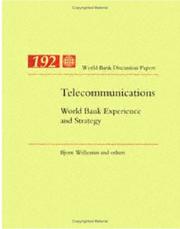| Listing 1 - 10 of 24 | << page >> |
Sort by
|

ISBN: 0821350927 Year: 2002 Publisher: Washington, D.C. World Bank
Abstract | Keywords | Export | Availability | Bookmark
 Loading...
Loading...Choose an application
- Reference Manager
- EndNote
- RefWorks (Direct export to RefWorks)

ISBN: 0821323911 Year: 1993 Publisher: Washington, D.C. World Bank
Abstract | Keywords | Export | Availability | Bookmark
 Loading...
Loading...Choose an application
- Reference Manager
- EndNote
- RefWorks (Direct export to RefWorks)
Book
ISSN: 0259210X ISBN: 1280016183 9786610016181 0585269351 Year: 1993 Volume: 192 Publisher: Washington, D.C. : The Bank,
Abstract | Keywords | Export | Availability | Bookmark
 Loading...
Loading...Choose an application
- Reference Manager
- EndNote
- RefWorks (Direct export to RefWorks)

ISBN: 0821350927 9786610087891 1280087897 0585458480 Year: 2002 Publisher: Washington, D.C. : World Bank,
Abstract | Keywords | Export | Availability | Bookmark
 Loading...
Loading...Choose an application
- Reference Manager
- EndNote
- RefWorks (Direct export to RefWorks)
Mass communications --- Chile --- Telecommunication --- Telephone companies --- Companies, Telephone --- Business enterprises --- Electric communication --- Mass communication --- Telecom --- Telecommunication industry --- Telecommunications --- Communication --- Information theory --- Telecommuting

ISBN: 0821338234 Year: 1996 Publisher: Washington, D.C. World Bank
Abstract | Keywords | Export | Availability | Bookmark
 Loading...
Loading...Choose an application
- Reference Manager
- EndNote
- RefWorks (Direct export to RefWorks)
Digital
Abstract | Keywords | Export | Availability | Bookmark
 Loading...
Loading...Choose an application
- Reference Manager
- EndNote
- RefWorks (Direct export to RefWorks)
Book
Abstract | Keywords | Export | Availability | Bookmark
 Loading...
Loading...Choose an application
- Reference Manager
- EndNote
- RefWorks (Direct export to RefWorks)
Bringing management of the radio spectrum closer to markets is long overdue. The radio spectrum is a major component of the infrastructure that underpins the information society. Spectrum management, however, has not kept up with major changes in technology, business practice, and economic policy that have taken place worldwide during the last two decades. For many years traditional government administration of the spectrum worked reasonably well, but more recently it has led to growing technical and economic inefficiencies as well as obstacles to technological innovation. Two alternative approaches to spectrum management are being tried in several countries, one driven by the market (tradable spectrum rights) and another driven by technology innovation (spectrum commons). This paper discusses the basic features, advantages and limitations, scope of application, and requirements for implementation of these three approaches. The paper then discusses how these approaches can be made to work under conditions that typically prevail in developing countries, including weak rule of law, limited markets, and constrained fiscal space. Although spectrum reform strategies for individual countries must be developed case by case, several broadly applicable strategic options are outlined. The paper proposes a phased approach to addressing spectrum reform in a country. It ends by discussing aspects of institutional design, managing the transition, and addressing high-level changes such as the transition to digital television, the path to third-generation mobile services, launching of wireless fixed broadband services, and releasing military spectrum. The paper is extensively annotated and referenced.
Access to information --- Broadband --- Climate Change --- Communication Technologies --- E-Business --- Environment --- ICT Policy and Strategies --- Information and Communication Technologies --- Information society --- Mobile services --- Private Sector Development --- Radio --- Radio Spectrum --- Roads and Highways --- Spectrum management --- Technological innovation --- Telecommunications Infrastructure --- Television --- Transport
Book
Abstract | Keywords | Export | Availability | Bookmark
 Loading...
Loading...Choose an application
- Reference Manager
- EndNote
- RefWorks (Direct export to RefWorks)
The radio spectrum is a major component of the telecommunications infrastructure that underpins the information society. Spectrum management, however, has not kept up with major changes in technology, business practice, and economic policy during the past two decades. Traditional spectrum management practice is predicated on the spectrum being a limited resource that must be apportioned among uses and users by government administration. For many years this model worked well, but more recently the spectrum has come under pressure from rapid demand growth for wireless services and changing patterns of use. This has led to growing technical and economic inefficiencies, as well as obstacles to technological innovation. Two alternative approaches are being tried, one driven by the market (spectrum property rights) and another driven by technology innovation (commons). Practical solutions are evolving that combine some features of both. Wholesale replacement of current practice is unlikely, but the balance between administration, property rights, and commons is clearly shifting. Although the debate on spectrum management reform is mainly taking place in high-income countries, it is deeply relevant to developing countries as well.
Business --- Business Models --- Climate Change --- Development Of Broadband --- E-Business --- Environment --- ICT Policy and Strategies --- Industry --- Information --- Information and Communication Technologies --- Information Society --- Law Enforcement --- Manufacturing --- Market Segments --- Mobile Phones --- Navigation --- Networks --- Private Sector Development --- Radio --- Radio Spectrum --- Result --- Roads and Highways --- Spectrum Management --- Technology --- Technology Industry --- Telecommunications --- Telecommunications Infrastructure --- Television --- Transport --- Wireless Technologies
Book
Abstract | Keywords | Export | Availability | Bookmark
 Loading...
Loading...Choose an application
- Reference Manager
- EndNote
- RefWorks (Direct export to RefWorks)
Bringing management of the radio spectrum closer to markets is long overdue. The radio spectrum is a major component of the infrastructure that underpins the information society. Spectrum management, however, has not kept up with major changes in technology, business practice, and economic policy that have taken place worldwide during the last two decades. For many years traditional government administration of the spectrum worked reasonably well, but more recently it has led to growing technical and economic inefficiencies as well as obstacles to technological innovation. Two alternative approaches to spectrum management are being tried in several countries, one driven by the market (tradable spectrum rights) and another driven by technology innovation (spectrum commons). This paper discusses the basic features, advantages and limitations, scope of application, and requirements for implementation of these three approaches. The paper then discusses how these approaches can be made to work under conditions that typically prevail in developing countries, including weak rule of law, limited markets, and constrained fiscal space. Although spectrum reform strategies for individual countries must be developed case by case, several broadly applicable strategic options are outlined. The paper proposes a phased approach to addressing spectrum reform in a country. It ends by discussing aspects of institutional design, managing the transition, and addressing high-level changes such as the transition to digital television, the path to third-generation mobile services, launching of wireless fixed broadband services, and releasing military spectrum. The paper is extensively annotated and referenced.
Access to information --- Broadband --- Climate Change --- Communication Technologies --- E-Business --- Environment --- ICT Policy and Strategies --- Information and Communication Technologies --- Information society --- Mobile services --- Private Sector Development --- Radio --- Radio Spectrum --- Roads and Highways --- Spectrum management --- Technological innovation --- Telecommunications Infrastructure --- Television --- Transport
Book
Abstract | Keywords | Export | Availability | Bookmark
 Loading...
Loading...Choose an application
- Reference Manager
- EndNote
- RefWorks (Direct export to RefWorks)
The radio spectrum is a major component of the telecommunications infrastructure that underpins the information society. Spectrum management, however, has not kept up with major changes in technology, business practice, and economic policy during the past two decades. Traditional spectrum management practice is predicated on the spectrum being a limited resource that must be apportioned among uses and users by government administration. For many years this model worked well, but more recently the spectrum has come under pressure from rapid demand growth for wireless services and changing patterns of use. This has led to growing technical and economic inefficiencies, as well as obstacles to technological innovation. Two alternative approaches are being tried, one driven by the market (spectrum property rights) and another driven by technology innovation (commons). Practical solutions are evolving that combine some features of both. Wholesale replacement of current practice is unlikely, but the balance between administration, property rights, and commons is clearly shifting. Although the debate on spectrum management reform is mainly taking place in high-income countries, it is deeply relevant to developing countries as well.
Business --- Business Models --- Climate Change --- Development Of Broadband --- E-Business --- Environment --- ICT Policy and Strategies --- Industry --- Information --- Information and Communication Technologies --- Information Society --- Law Enforcement --- Manufacturing --- Market Segments --- Mobile Phones --- Navigation --- Networks --- Private Sector Development --- Radio --- Radio Spectrum --- Result --- Roads and Highways --- Spectrum Management --- Technology --- Technology Industry --- Telecommunications --- Telecommunications Infrastructure --- Television --- Transport --- Wireless Technologies
| Listing 1 - 10 of 24 | << page >> |
Sort by
|

 Search
Search Feedback
Feedback About UniCat
About UniCat  Help
Help News
News